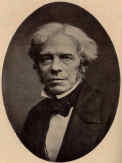"Up to 1833 Faraday was bringing the forces of nature in subjection to man on a salary of only £100 per annum, with house, coals, and candles, as the funds of the Institution would not at that time afford more; but among the sedate habitues of the place was a tall, jovial gentleman, who lounged to the lectures in his old fashioned blue coat and brass buttons, gray smalls, and white stockings, who was a munificent friend in need. This was John Fuller, a member of Parliament. He founded a Professorship of Chemistry, with an endowment that brings in nearly £100 a year, and gave the first appointment to Faraday for life. When the Institution became richer, his income was increased; and when, on account of the infirmities of age, he could no longer investigate, lecture, or keep accounts, the managers insisted on his still retaining in name his official connection with the place, with his salary and his residence there. Nor, indeed, could they well have acted otherwise; for, though the Royal Institution afforded in the first instance a congenial soil for the budding powers of Faraday, his growth soon became its strength, and eventually the blooming of his genius, and the fruit it bore, were the ornament and glory of the Institution."
Extracted from: Michael Faraday by J. H. Gladstone, Ph.D., F.R.S. , New York Harper & Brothers, Publishers, Franklin Square 1872. (John Hall Gladstone became the third Fullerian Professor of Chemistry in 1874.)
Michael Faraday is the first and perhaps best known Fullerian Professor of Chemistry (1833). In fact, this post was created specifically for him by Jack Fuller. He was appointed to this position for life.
Using an experimental approach, Faraday was able to demonstrate many of the principles that led to the development of the electric motor.
"It is indeed remarkable in the highest degree to observe how, by a kind of intuition, without using a single formula, [Faraday] found out a number of comprehensive theorems which can only be proved by the highest powers of mathematical analysis." German mathematician Hermann von Helmholtz
An interesting parallel between Michael Faraday and Jack Fuller is the fact that they both refused honours others wished to bestow upon them.
"He was offered and refused the Presidency of the Royal Society. He was twice offered and refused the Presidency of the Royal Institution. He was offered and refused a knighthood, commenting, 'I must remain plain Michael Faraday to the very last.'"
Source: Dr Jim Smith, IEE President 1989-90,speech to mark the unveiling of the Michael Faraday Statue at Savoy Place, 1 November 1989 at 5.00pm © 2003 IEE
"There is a popular story that at some time during his political career, Fuller was offered a peerage by William Pitt [the Younger], presumably either to encourage his support or to get rid of him. Fuller is said to have declined the offer adding: 'I was born Jack Fuller and Jack Fuller I'll die.' Perhaps it was around this time [1783] the offer was made, although the two men were to meet up again in Parliament in later years."
Geoff Hutchinson, Fuller of Sussex: A Georgian squire (Hastings, Sussex: M & W Morgan, 1993, revised 1997), p.38.
